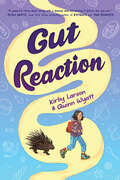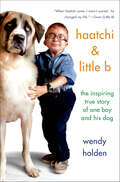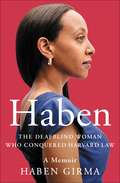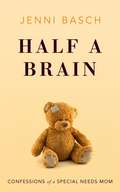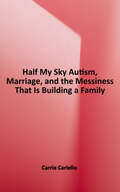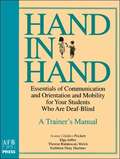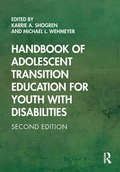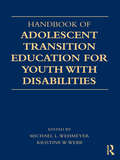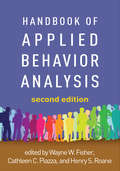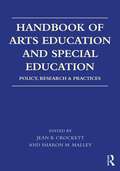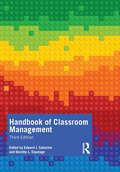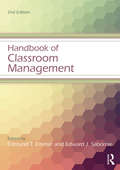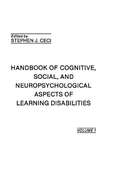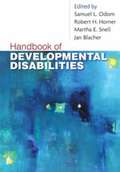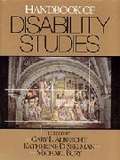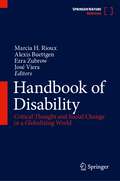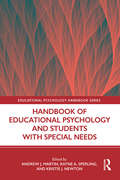- Table View
- List View
Gut Reaction
by Kirby Larson Quinn WyattCritically acclaimed, bestselling author and Newbery Honor-winner, Kirby Larson, and her daughter, debut author, Quinn Wyatt, pen this gorgeously moving and often funny story that explores what living with a chronic illness is like. Inspired by Quinn's own personal journey, Gut Reaction is full of heart and humor and highlights the importance of asking for help when it comes to mental and physical health alike.Tess Medina is still dealing with the loss of her father when she starts at a new school. One way she is still able to feel close to him is by doing what she does best: baking. He taught her everything she knows. But when tasting her creations causes a deep stabbing pain in her abdomen, she tries to power through and be strong in the same way she powers through her emotional pain. She doesn’t mind too much--she’s okay with sharing her baked goods at school in the hopes of making new friends.Lucky for Tess, her baking skills attract the right kind of attention, and she assembles a ragtag team to help her taste her new and classic creations in preparation for the Jubilee Flour Junior Baker West Coast competition. This is a chance to redeem herself and prove that she's a star baker. Above all, Tess is desperate to win first place and make her dad proud.But leading up to the competition, Tess's pain gets worse and worse, and, soon, she finds that she's avoiding so many foods that she's barely eating. When the physical pain becomes too great, Tess will be forced to confront everything she has been trying so desperately to hide.From Newbery Honor author Kirby Larson and her daughter, debut author Quinn Wyatt, comes a poignant, sometimes silly, and always moving story of coming to grips with grief and finding the sweet filling inside every treat.Praise for Gut Reaction by Kirby Larson and Quinn Wyatt:"A powerful story about living with a disease and not letting it define who you are."--Alan Gratz, New York Times bestselling author of Refugee and Two Degrees."Kirby Larson and Quinn Wyatt have cooked up a rich, warm story about Crohn's Disease, courage, and cookies. The voice is heartfelt and authentic, leavened with humor and, oh my frog, delicious desserts. Gut Reaction is a wonderful book about important things, and I recommend it highly."--Karen Cushman, author of the Newbery Award-winning The Midwife's Apprentice."A multi-layered, straight-from-the-heart story written with a light, deft touch,Gut Reaction will inspire readers to pursue their creative passions. I loved this touching, sweet, and engaging book!"--Barbara Dee, award-winning author of Unstuck."Sweet and delicious! You will gobble up this book in one bite!"--Jennifer L. Holm, New York Times bestselling author of The Fourteenth Goldfish."Gut Reaction is a much-needed and important book for everyone: those suffering with Crohn's disease, their family and friends who want to help them, and for all the rest who need to understand. Written with the voice of authenticity by a mother/daughter team who know firsthand the effects of this painful and often embarrassing disease. Toss in a handful of lovable and diverse characters and an edge-of-your-seat cooking competition and Gut Reaction is a recipe for success."--Barbara O'Connor, author of How To Steal A Dog and WISH."I would have finished Gut Reaction in one swoop--but I didn't want it to end. I especially loved the baking connection, but the story's honesty, the humor and the friendships added so many layers. If the topic seems serious--and it is, the way Tess struggles to accept her illness will resonate with readers. Tess Medina is an inspiration. Her story will be one you'll remember long after that last page is turned."--Augusta Scattergood, author of Glory Be and The Way To Stay In Destiny."Great British Baking Show meets Guts by Raina Telgemeie
HIV/AIDS Prevention: A Guide for Working with People Who Are Blind or Visually Impaired
by Judy Matsuoka Christine E. Pawelski. Gaylen KappermanThis manual is designed to help rehabilitation teachers, educators, and other practitioners who work with blind and visually impaired persons provide their clients with the facts they need to deal with the issues concerning HIV/AIDS.
Haatchi & Little B: The Inspiring True Story of One Boy and His Dog
by Wendy Holden#1 International BestsellerWhen Owen met Haatchi, the lives of one adorable little boy and one great, big dog were destined to change forever.Owen-known to his family as "little buddy" or "Little B"-has a rare genetic disorder that leaves him largely confined to a wheelchair. Before being united with Haatchi, Little B was anxious and found it difficult to make friends. Haatchi-an adorable Anatolian Shepherd puppy-was abused and left for dead on railroad tracks. He was struck by an oncoming train, and although his life was saved, his leg and tail were partially severed. Haatchi was left massively disabled and totally dispirited.But kind-hearted Will and Colleen Howkins, Little B's father and step-mother, decided to introduce the big dog and the little boy to each other, and an unbelievable bond was formed that transformed both boy and dog in miraculous ways.Wendy Holden's Haatchi & Little B is the true story of an astonishing little boy, a very special dog, and the inspiring, inseparable pair that they make together.
Haben: The Deafblind Woman Who Conquered Harvard Law
by Haben GirmaThe incredible life story of Haben Girma, the first Deafblind graduate of Harvard Law School, and her amazing journey from isolation to the world stage. <p><p> Haben grew up spending summers with her family in the enchanting Eritrean city of Asmara. There, she discovered courage as she faced off against a bull she couldn't see, and found in herself an abiding strength as she absorbed her parents' harrowing experiences during Eritrea's thirty-year war with Ethiopia. Their refugee story inspired her to embark on a quest for knowledge, traveling the world in search of the secret to belonging. She explored numerous fascinating places, including Mali, where she helped build a school under the scorching Saharan sun. Her many adventures over the years range from the hair-raising to the hilarious. <p> Haben defines disability as an opportunity for innovation. She learned non-visual techniques for everything from dancing salsa to handling an electric saw. She developed a text-to-braille communication system that created an exciting new way to connect with people. Haben pioneered her way through obstacles, graduated from Harvard Law, and now uses her talents to advocate for people with disabilities. <p> HABEN takes readers through a thrilling game of blind hide-and-seek in Louisiana, a treacherous climb up an iceberg in Alaska, and a magical moment with President Obama at The White House. Warm, funny, thoughtful, and uplifting, this captivating memoir is a testament to one woman's determination to find the keys to connection.
Hadley Course Catalog
by The Editors at the Hadley School for the BlindThe course catalog from the Hadley School for the Blind, detailing their tuition-free distance education programs. With more than 100 courses across four program areas, find the course that is right for you, and join the 10,000 individuals worldwide who call themselves Hadley students.
Hadley Course Catalog for Adult Continuing Education & High School Programs 2008-2009
by The Hadley School for the BlindHadley School for the Blind Course Catalog for Adult Continuing Education & High School Programs 2008-2009 For individuals who are legally or functionally blind or progressively visually impaired and at least 14 years old.
Hadley Family Education Course Catalog 2008-2009
by The Hadley School for the BlindHadley School for the Blind Course catalog for the Family Education Program. Courses for: the grandparent and parent of a severely visually impaired child, and the spouse, significant other, adult sibling or adult child of a severely visually or blind adult.
Half A Brain: Confessions of a Special Needs Mom
by Jenni BaschA fascinating and inspiring memoir about one woman's epic struggle raising a child with severe disabilities. At nine months pregnant, Jenni Basch learns that her unborn baby experienced a catastrophic brain injury and may not survive. Against insurmountable odds, her daughter survives and Jenni is faced with raising a child with complex medical issues.When her daughter is diagnosed with a devastating form of epilepsy, Jenni and her husband must make the ultimate decision on behalf of their daughter. In order to save her, they must consent to a radical surgery, the removal of half the brain. With candor and wit, Jenni introduces us to a world usually unseen and misunderstood. Half A Brain provides an extraordinary account of a mom raising a child with special needs. Through each terrifying diagnosis and crisis, Jenni must face and confront her own insecurities, fears, judgments, and inexperience. But even when all hope seems lost, she finds a strength she never imagined possible.
Half My Sky: Autism, Marriage, and the Messiness That Is Building a Family
by Carrie CarielloFive kids. Autism. Marriage. Building a family is a messy business. In her most revealing memoir yet, Carrie is candid about the challenges of marriage, motherhood, and keeping one's identity in the midst of raising a family. She gives the reader a glimpse into life with a diagnosed child. She shares their experience with puberty, social media, high school, and steps toward independent living. Composed as a series of powerful letters, her writing is gritty yet tender. In prose that is nearly poetic, Carrie makes you feel as though you are old friends, sitting down for a cup of coffee and a heartfelt conversation. She chronicles the journey to find a post-high school opportunity for her son Jack and gives an honest account about the conflict when it comes to letting him go. She explains how, in this autism life, there is no manual. There are no instructions for how to untether yourself from a tender child who needed you for so long, you forgot what life was like before he disrupted your world in an exquisitely magical way. Her story will resonate with anyone preparing to transition a child after high school and beyond. Again and again, Carrie reminds us of a single truth. We are not alone. You are not alone.
Halfway House
by Katharine NoelOne day, Angie Voorster-diligent student, all-star swimmer, and Ivy-League-bound high school senior-dives to the bottom of a pool and stays there. In that moment, everything the Voorster family believes they know about each other changes. As Angie swings between manic highs and dangerous lows, the Voorsters struggle to maintain the appearance of an ideal New England family. It is only when Angie is finally able to fend for herself that the family allows itself to fall apart and then regather in a new, fundamentally changed way. With grace and precision, debut novelist Katharine Noel guides us through a world where love is imperfect, and where longing for an imagined ideal can both destroy one family's happiness and offer it redemption.
Hand in Hand: A Trainer's Manual
by Elga Joffee Jeanne Glidden Prickett Kathleen Mary Huebner Therese Rafalowski WelchAn in-service training guide that presents structured information and guidelines for using the Hand In Hand materials with various audiences. Focusing on the needs of the trainer, this manual provides sample blueprints for individual workshops, as well as an overview of training, assessment, and evaluation. Also includes sample forms for conducting a pre-training needs assessment and post training evaluation.
Hand in Hand: Essentials of Communication and Orientation and Mobility for Your Students Who Are Deaf-Blind: Volume I, Units 1, 2, and 3
by Elga Joffee Jeanne Glidden Prickett Kathleen Mary Huebner Therese Rafalowski WelchThis series was designed to develop resources for educators of children who are visually impaired, hearing impaired, and severely disabled. The Hand In Hand materials emphasize the communication and mobility skills crucial to independence, and provide important information to help service providers do their jobs effectively. Containing contributions from more than 30 nationally recognized experts in the field of deaf-blindness, this groundbreaking information consists of four components that can be used separately or together. A two-volume, self-study text that explains how deaf-blind students learn, focusing on essential communication and mobility skills. Designed to provide comprehensive information in an easy-to-read way, this invaluable resource includes identified key concepts, self-study questions and answers, and references. The user-friendly format includes concise "Help at a Glance" and "From Theory to Practice" sections throughout. Sidebars, figures, tables, graphs, and photos offer additional perspectives and information.
Hand in Hand: Essentials of Communication and Orientation and Mobility for Your Students Who Are Deaf-Blind: Volume II Appendixes, Glossary, Resources, Index
by Elga Joffee Jeanne Glidden Prickett Kathleen Mary Huebner Therese Rafalowski WelchThis series was designed to develop resources for educators of children who are visually impaired, hearing impaired, and severely disabled. The Hand In Hand materials emphasize the communication and mobility skills crucial to independence, and provide important information to help service providers do their jobs effectively. Containing contributions from more than 30 nationally recognized experts in the field of deaf-blindness, this groundbreaking information consists of four components that can be used separately or together. A two-volume, self-study text that explains how deaf-blind students learn, focusing on essential communication and mobility skills. Designed to provide comprehensive information in an easy-to-read way, this invaluable resource includes identified key concepts, self-study questions and answers, and references. The user-friendly format includes concise "Help at a Glance" and "From Theory to Practice" sections throughout. Sidebars, figures, tables, graphs, and photos offer additional perspectives and information.
Handbook for Itinerant and Resource Teachers of Blind and Visually Impaired Students
by Doris Willoughby Sharon DuffyProvides suggestions for teachers of the visually impaired
Handbook of Adolescent Transition Education for Youth with Disabilities
by Michael L. Wehmeyer Karrie A. ShogrenNow in a thoroughly revised and updated second edition, this handbook provides a comprehensive resource for those who facilitate the complex transitions to adulthood for adolescents with disabilities. Building on the previous edition, the text includes recent advances in the field of adolescent transition education, with a focus on innovation in assessment, intervention, and supports for the effective transition from school to adult life. The second edition reflects the changing nature of the demands of transition education and adopts a "life design" approach. This critical resource is appropriate for researchers and graduate-level instructors in special and vocational education, in-service administrators and policy makers, and transition service providers.
Handbook of Adolescent Transition Education for Youth with Disabilities
by Michael L. Wehmeyer Kristine W. WebbTransition from secondary education to adulthood represents a period during which adolescents with disabilities face multiple responsibilities and changing roles that include establishing independence, attending postsecondary education or training, developing social networks, choosing a career, participating in their communities, and managing healthcare and financial affairs. Sponsored by the Division of Career Development and Transition (DCDT) of the Council of Exceptional Children, this handbook provides a comprehensive resource to the communities of educators, related service and agency personnel, families, caretakers, counselors, and other stakeholders who facilitate these complex transitions to adulthood for adolescents with disabilities. Comprehensive – This comprehensive volume includes coverage of historical foundations, policy, transition programming and planning, development of student skills, and program structure. It also recommends transition supports for students with specific disabilities. Organizing Taxonomy – The book is organized around a well recognized taxonomy for adolescent transition used by many states to design and reform their transition services. Expertise – The volume editors are past-presidents of the Council for Exceptional Children’s Division on Career Development and are leaders in transition research and practice. Contributors are well-recognized for their expertise in transition. Chapter Structure – Each chapter includes a discussion of evidence-based research, recommended practices, suggestions for transition personnel and families, and additional resources. This book is appropriate for researchers and graduate-level instructors in special education and vocational education, inservice administrators and policy makers, and transition service providers.
Handbook of Applied Behavior Analysis, Second Edition
by Wayne W. Fisher, Cathleen C. Piazza and Henry S. RoaneWidely regarded as the authoritative work on the principles and practice of applied behavior analysis (ABA), this indispensable volume is now in a revised and expanded second edition. Leading experts present evidence-based procedures for supporting positive behaviors and reducing problem behaviors with children and adults in diverse contexts. Chapters delve into applications in education, autism treatment, addictions, behavioral pediatrics, and other areas. Covering everything from behavioral assessment and measurement to the design and implementation of individualized interventions, the Handbook is a complete reference and training tool for ABA practitioners and students. New to This Edition *Incorporates key advances in research, theory, and clinical practice. *Chapters on additional applications: school consultation, pediatric feeding disorders, and telehealth services. *Chapters on quantitative analysis of behavior (matching and behavioral momentum theory) and behavioral economics. *Updated discussions of professional issues, ABA certification, and technology tools.
Handbook of Arts Education and Special Education: Policy, Research, and Practices
by Jean B. Crockett Sharon M. MalleyThe Handbook of Arts Education and Special Education brings together, for the first time in a single reference volume, policy, research, and practices in special education and arts education synthesized to inform stakeholders across a broad spectrum of education. This handbook encompasses arts education for students with disabilities, from pre-K through transition to postsecondary education and careers as well as community arts education, with particular attention to conceptual foundations; research-based practices; professional standards; students’ cognitive, artistic, and social growth; career education; and future directions for research and practice in special education and arts education.
Handbook of Classroom Management
by Dorothy L. Espelage Edward J. SabornieThe Handbook of Classroom Management, Third Edition, is an authoritative treatment of the latest science and development in the study of classroom management in schools. Evidence-based classroom management practices and programs are essential to enhancing students’ academic, behavioral, social-emotional, and motivational outcomes across grade levels. This comprehensive volume collects scholarship and cutting-edge research for graduate students and faculty of psychology, teacher education, curriculum and instruction, special education, and beyond. The book has been thoroughly revised and expanded with updated coverage of foundational topics such as effective instruction, preventative strategies, positive behavior intervention and supports, family–school relationships, legal issues, and other related topics, while also giving new attention to social justice, students on the autism spectrum, and adaptations across urban, rural, and virtual contexts.
Handbook of Classroom Management: Research, Practice, And Contemporary Issues
by Edmund T. Emmer Edward J. SabornieThe field of classroom management is not a neatly organized line of inquiry, but rather consists of many disparate topics and orientations that draw from multiple disciplines. Given the complex nature of the field, this comprehensive second edition of the Handbook of Classroom Management is an invaluable resource for those interested in understanding it. This volume provides up-to-date summaries of research on the essential topics from the first edition, as well as fresh perspectives and chapters on new topics. It is the perfect tool for both graduate students and practitioners interested in a field that is fascinating but not immediately accessible without the proper guidance.
Handbook of Cognitive, Social, and Neuropsychological Aspects of Learning Disabilities: Volume I
by Stephen J. CeciRecognized as the definitive reference in the field, this book addresses a broad range of biologically based disorders that affect children's learning and development. Leading authorities review the genetics of each disorder; its course and outcome; associated developmental, cognitive, and psychosocial challenges; and what clinicians and educators need to know about effective approaches to assessment and intervention. Coverage encompasses numerous lower-incidence neurodevelopmental disabilities as well as more frequently diagnosed learning and behavior problems with a genetic component.
Handbook of Developmental Disabilities
by Martha E. Snell Samuel L. Odom Robert H. Horner Jan BlacherIn this reprint from 2007, Odom (child development, U. of North Carolina at Chapel Hill) et al. bring together 30 chapters reviewing current knowledge about different dimensions of developmental disabilities, neuroscientific and genetic foundations, impacts on health, learning, and behavior, and educational and clinical practices. Scholars of education, human development, psychiatry, psychology, learning disabilities, and other areas, who are based in North America and the UK, discuss definition and classification issues, social policy, research methods, cultural influences, and established and new approaches to promoting communication and language abilities, academic skills, positive social interactions, vocational and independent living skills, and positive behavior support, family adaptation, and resilience with children and adults. Other topics include dual diagnosis, pharmacological and behavioral treatments, families, and international perspectives and practices. Annotation c2009 Book News, Inc., Portland, OR (booknews.com)
Handbook of Disability Studies
by Gary L. Albrecht Katherine D. Seelman Michael BuryDrawing on the insights of disability scholars around the world and the creative advice of an international editorial board, this book engages the reader in the critical issues and debates framing disability studies and places them in an historical and cultural context. Five years in the making, this one volume summarizes the ongoing discourse ranging across continents and traditional academic disciplines.
Handbook of Disability: Critical Thought and Social Change in a Globalizing World
by Ezra Zubrow Marcia H. Rioux Alexis Buettgen José VieraThis important reference work maps the terrain of disability across the world by providing an overview of issues, concerns and developments in the domains of society, culture, medicine, law, policy, justice, education, economics, and science and technology. It is a truly inclusive volume bringing together perspectives from researchers, activists, professionals, service providers, international development experts and policymakers based in the global North and South, and it particularly focuses on the voices of the principal stakeholders---disabled persons themselves. Working from an interdisciplinary matrix, this book reviews historical developments, contemporary practices and policies . It addresses hitherto unchartered areas in the disability discourse that will be significant in the years to come. In the modern world, the social and medical responses to disability have been separation, segregation and incarceration of disabled people. These responses are reflected in practices of special education, building of asylums, medical classifications and sheltered employment. Current thinking on disability is based on the need to overcome such segregation through the enactment of human rights and socially just programmes, policies and laws such as inclusive education, affirmative action, reasonable accommodation, and supported decision-making. This book explores:· The evolution of the concept of disability over space and time and identifies approaches to disability, debility, equality and equity;· Broad trends in research on disability across the world;· New directions in work on disability;· The emergence of a global disability movement and its etiology;· Intersections of disability with other demographic variables like gender, race, caste, and age; and· Historical and socio-economic interfaces with colonialism, globalization, and social development. Spread over14 sections and spanning more than 80 chapters, this volume is the most comprehensive, up-to-date reference work available on the subject.
Handbook of Educational Psychology and Students with Special Needs (Educational Psychology Handbook)
by Andrew J. Martin Kristie Newton Rayne SperlingHandbook of Educational Psychology and Students with Special Needs provides educational and psychological researchers, practitioners, policy-makers, and graduate students with critical expertise on the factors and processes relevant to learning for students with special needs. This includes students with attention-deficit/hyperactivity disorder, other executive function difficulties, behavior and emotional disorders, autism spectrum disorder, intellectual disabilities, learning disabilities, dyslexia, language and communication difficulties, physical and sensory disabilities, and more. With the bulk of educational psychology focused on "mainstream" or "typically developing" learners, relatively little educational psychology theory, research, measurement, or practice has attended to students with "special needs." As clearly demonstrated in this book, the factors and processes studied within educational psychology—motivation and engagement, cognition and neuroscience, social-emotional development, instruction, home and school environments, and more—are vital to all learners, especially those at risk or disabled. Integrating guidance from the DSM-5 by the American Psychiatric Association and the International Classification of Diseases (ICD-10) by the World Health Organization, this book synthesizes and builds on existing interdisciplinary research to establish a comprehensive case for effective psycho-educational theory, research, and practice that address learners with special needs. Twenty-seven chapters by experts in the field are structured into three parts on diverse special needs categories, perspectives from major educational psychology theories, and constructs relevant to special needs learning, development, and knowledge building.
